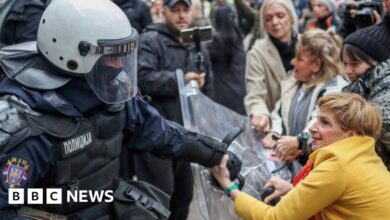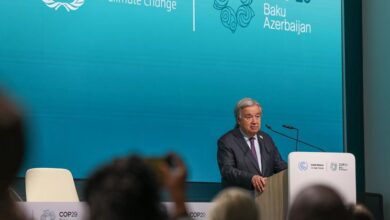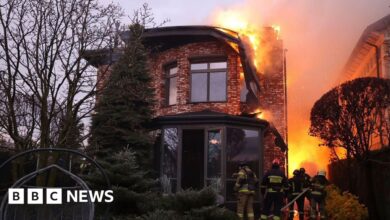Huge explosion in Beirut after new Israeli air strikes
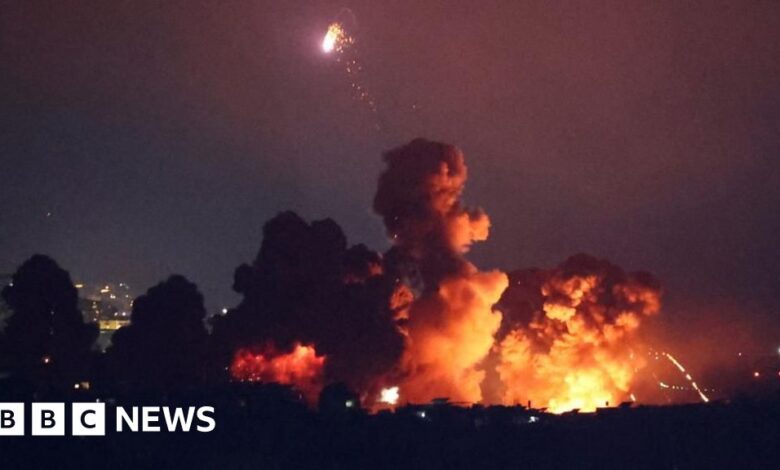
Israeli bombing caused massive explosions in Beirut, including one near the international airport in another night of airstrikes targeting Hezbollah.
The airport borders Dahieh, Hezbollah’s stronghold in the capital. Plumes of smoke could be seen over the city on Friday morning.
American media agencies quoted Israeli officials as saying the target was Hashem Safieddine, cousin of former Hezbollah leader Hassan Nasrallah. Safieddine is widely seen as the most likely candidate to replace Nasrallah after he died in an Israeli attack last week.
Lebanon’s Ministry of Public Health said 37 people were killed in ground and air attacks in the past 24 hours while 151 others were injured.
Elsewhere, the Lebanese army said two of its soldiers were killed in the south of the country as Israeli forces continued to attack Hezbollah and ordered 20 other towns and villages to evacuate.
The Israeli military has not commented but said its troops had killed Hezbollah fighters near the border. Hezbollah said it had targeted Israeli troops on both sides of the border.
Two deadly attacks targeted Lebanese army soldiers just hours apart on Thursday, the third day of the invasion.
In the first incident, the army said, one soldier was killed and another injured “as a result of enemy Israeli aggression during an evacuation and rescue operation together with the Lebanese Red Cross in the village”. Taybeh”.
The Red Cross said four of its volunteers also suffered minor injuries and that their movement was coordinated with United Nations peacekeeping forces.
In the second incident, another soldier was killed “after enemies of Israel targeted an army post in the Bint Jbeil area,” the army said.
“Personnel at the station responded to fire sources,” the Lebanese army added, marking a rare involvement in a conflict in which it was not involved.
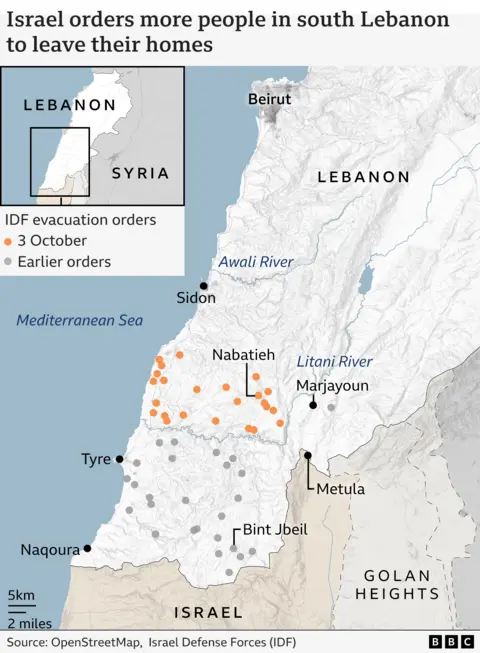
The news comes as the Israel Defense Forces (IDF) asked residents of more than 20 other towns and villages in the south, including the regional capital Nabatieh, to leave immediately for their safety. themselves.
Unlike the communities ordered to evacuate on Tuesday, they are all located north of the Litani River, about 30km (18 miles) from the border.
Before the invasion, Israel demanded that Hezbollah withdraw its troops to Litani, in accordance with the United Nations Security Council resolution that ended their last war in 2006.
Speaking to the BBC from Beirut, the World Food Program’s country director for Lebanon, Matthew Hollingworth, described the situation there as “terrible”.
“There’s black smoke billowing over the south suburbs and we see it every morning when we go to work and we see it all day long. And there are a staggering number of displaced people across the city.”
“These cars everywhere belong to people fleeing the war in the south of the country and the southern suburbs. Traffic everywhere, people sleeping outside.”
Juan Gabriel Wells, Lebanon country director for the International Rescue Committee, said nearly half of the evacuees surveyed by his organization in government-run shelters were children under 15 years old.
Israel’s latest airstrikes on Beirut came 24 hours after a residential building in the center of the capital was attacked. A civil defense agency linked to Hezbollah also said seven of its first responders were among the nine people killed in the attack.
Lebanon’s Health Minister later said more than 40 medical staff and firefighters had been killed by Israeli fire in the past three days.
The Israeli Air Force carried out airstrikes on Thursday against targets it said belonged to Hezbollah, including the group’s intelligence headquarters, weapons production sites and storage facilities. weapons.
Two weeks of Israeli airstrikes and other attacks targeting Hezbollah have killed more than 1,300 people across Lebanon and displaced more than a million, according to local authorities.
Israel continues its offensive after nearly a year of cross-border conflict sparked by the war in Gaza, saying it wants to ensure the safe return of residents in the border area displaced by the attacks. Hezbollah rockets, missiles and drones.
Hezbollah is a Shia Muslim military, political and social organization that holds significant power in Lebanon. It is considered a terrorist organization by Israel, the US, the UK and other countries.
The IDF also announced on Thursday that its aircraft attacked 200 Hezbollah “terrorist targets” in southern Lebanon and elsewhere overnight, including weapons storage facilities and observation posts. About 15 Hezbollah fighters were killed when the municipality building in Bint Jbeil was attacked.
They later said a structure housing three Hezbollah commanders was destroyed in a joint operation by the air force and ground forces.
Hezbollah said Thursday evening that its fighters “repelled failed attempts” by Israeli commandos to enter several border villages during the day.
The group also said it had targeted “enemy gatherings” and homes on the other side of the border, and continued to fire rockets deep into northern Israel.
The IDF said more than 230 projectiles were launched into Israeli territory during the day. Most were blocked or fell in open areas and there were no reports of casualties.
Communities along Israel’s northern border fence are now closed military zones.
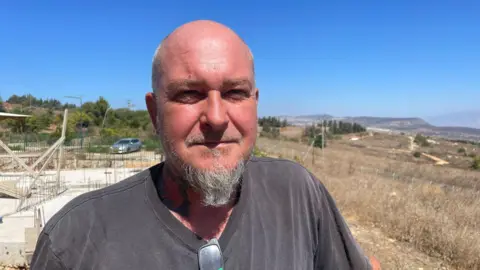
Dean Sweetland, a former British soldier who moved to Israel eight years ago, is one of the few people still living on a nearly empty kibbutz near the Lebanese town of Bint Jbeil.
He told the BBC that his house shook several times a day from rockets and anti-tank missiles fired from Lebanon, some of which were intercepted by Israel’s air defenses.
“We cannot continue this for another year, with Hezbollah sitting on our borders just waiting for October 7 to attack us,” he said, referring to the deadly attack by Hamas entered southern Israel last year, sparking the war in Gaza.
“But my son is in the army, and do we want him there, slaughtered, where Hezbollah has been waiting for us to come for almost 20 years?”
“It won’t be pretty,” he continued, “but if it’s necessary, then it’s necessary.”



